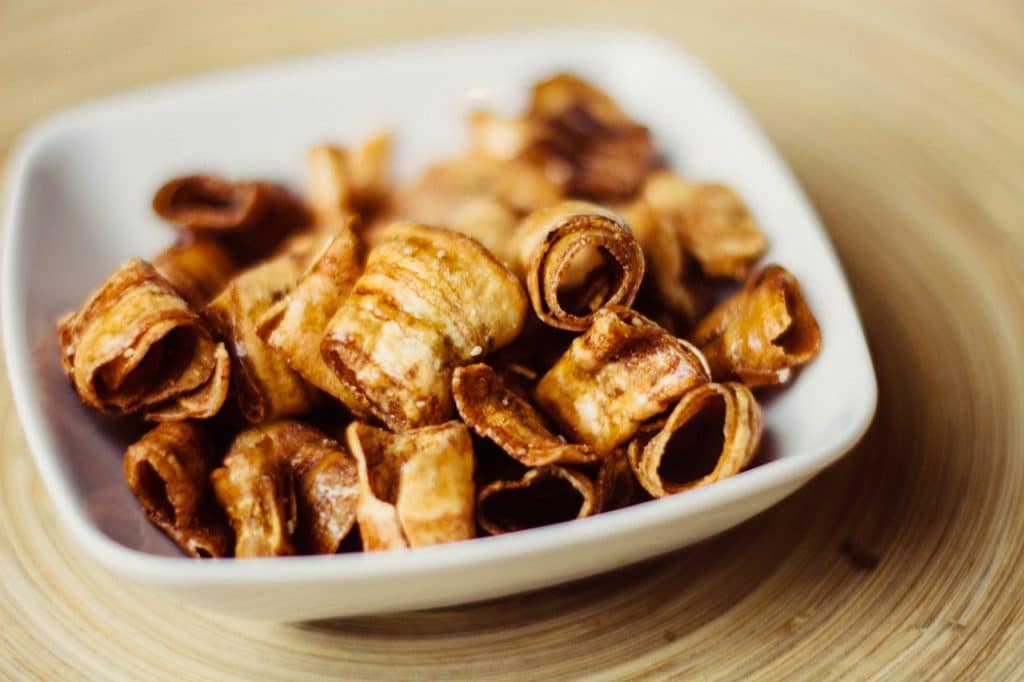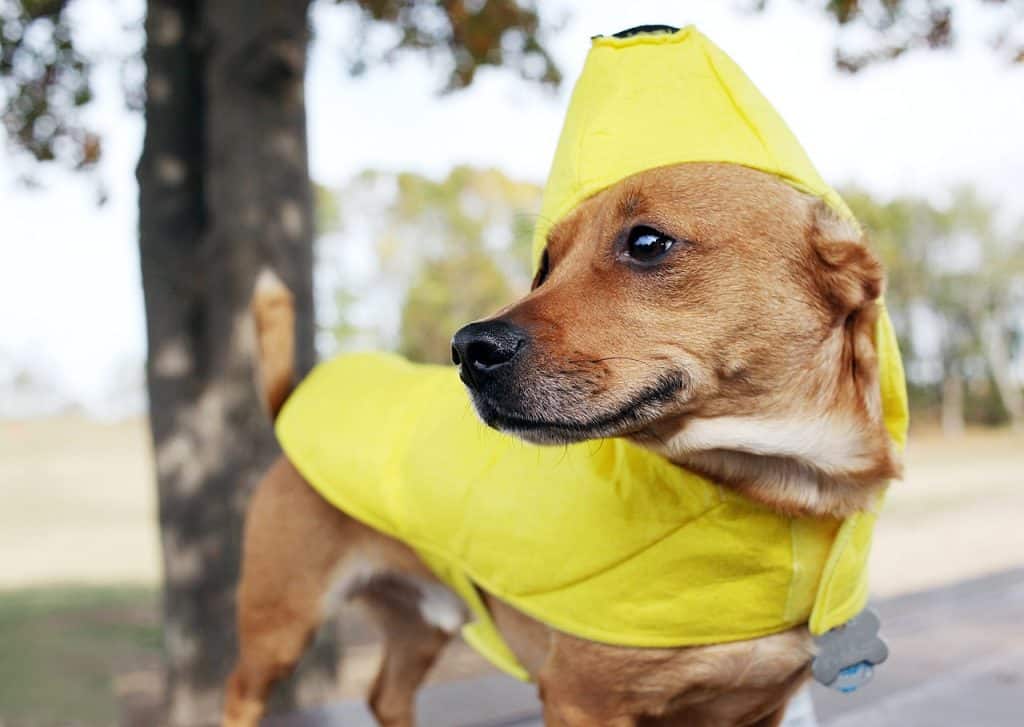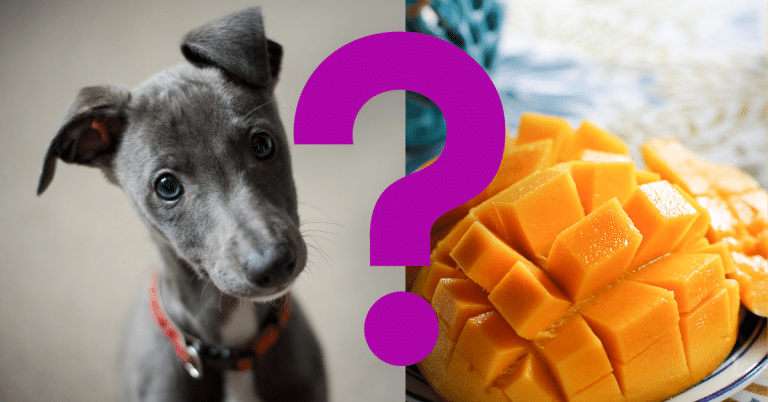Can Dogs Eat Banana Chips? A Vet’s Opinion

Thin slices of bananas are deep-fried or dried to produce crispy, sweet snacks known as “banana chips.” But can you feed banana chips to your dog?
Yes, in moderation, dogs can eat banana chips. Due to their inherent sweetness and potassium content, these dried banana slices are a nutritious, low-fat dog treat. Banana chips have a high sugar and calorie content, which, if consumed excessively, can cause weight gain and digestive problems, so they should only be provided occasionally as a snack. Additionally, since additional sugar, salt, and other undesirable components can be hazardous to dogs, it’s crucial to ensure the banana chips don’t include any of these. For individualized dietary advice for your pet, always speak with your vet.
Benefits of banana chips for dogs
When eaten sparingly, banana chips can benefit dogs in several ways:
Rich In Nutrients
Banana chips are a good source of potassium, vitamins B6 and C, and dietary fiber, all of which are important for good health.
Energy Boost
Banana chips are an excellent treat for energetic dogs during athletic exercises since their natural sugars give them a quick energy boost.
Rich In Fiber
The dietary fiber in bananas helps with digestion and can help control bowel movements, which may help with constipation.
Low Fat
Banana chips are a healthier option for many commercial dog treats that may include excessive amounts of fat because they are generally low in fat.
Taste Appeal
Banana chips are an appealing and simple-to-administrate treat during training or an after-training reward for dogs because they generally love their sweet flavor.
Balance Of Potassium
In dogs, the potassium content supports healthy heart and muscle function.
But it’s important to stress moderation. Due to their high sugar content, eating too many banana chips might cause weight gain and digestive problems. Before adding new treats to your dog’s diet, always check with your veterinarian to ensure they meet your pet’s needs. The finest dog banana chips are homemade, unsalted, and without added sugar.

How to safely give banana chips to dogs
If done carefully and in moderation, feeding banana chips to your dog can be both safe and fun. Here are some recommendations to make sure your pet can safely eat banana chips:
Pick The Best Banana Chips
Choose plain, unsalted, unsweetened banana chips. Preservatives, flavors, and added sugars should be avoided as they might be hazardous to dogs.
Managing Portions
Banana chips shouldn’t be a staple of your dog’s diet but should be provided as an occasional treat. To avoid consuming too many calories, moderation is essential.
Cut Them Into Smaller Pieces By Slicing Them
If your dog is a smaller breed, you should break banana chips into more manageable pieces to reduce choking problems.
Keep An Eye Out For Digestive Sensitivity Or Allergies
As you progressively introduce banana chips into your dog’s diet, watch for allergic reactions or digestive problems. Some dogs could react negatively to novel meals.
Serve Banana Chips That Are Fresh Or Dehydrated
A healthy alternative is fresh banana slices, but if you select dehydrated chips, be sure they don’t include dangerous additives or artificial components.
Consult Your Veterinarian
Consult your veterinarian before adding any additional treats to your dog’s diet. Depending on your dog’s breed, age, and health, they can offer tailored advice.
Dog Food Staples For A Balanced Diet
Ensure your dog’s regular, balanced meal is not replaced by temptations like banana chips. They ought to supplement their primary source of nourishment.
Monitor Your Dog
When offering your dog banana chips, watch for any adverse reactions. Stop feeding them immediately if you detect strange behavior, like vomiting or diarrhea.
Keep Overripe Bananas From Being Fed
Bananas that are too ripe may contain more sugar and, therefore, not be suitable for dogs. For chips, stick to bananas that are ripe but not highly ripe.
Banana Chips In The Freezer As A Summer Treat
You can freeze banana chips and serve them as a cool, refreshing treat during the hot weather.
Regularly Brush Your Dog’s Teeth
Bananas’ natural sugars might adhere to your dog’s teeth and cause dental problems. Providing dental chews or brushing your dog’s teeth regularly can promote good oral health.
Adapt To The Needs Of Your Dog
Keep in mind that every dog has unique nutritional needs and sensitivities. Adjust as necessary because what suits one dog may not suit another.
According to these rules, you can give your dog banana chips as an occasional and pleasurable treat while protecting their health and well-being. Always put your dog’s safety first, and if you have any worries or queries regarding their nutrition, speak with a veterinarian.
Will banana chips make a dog sick?
When consumed in moderation and without the addition of hazardous components like sugar or salt, banana chips are usually safe for dogs. However, excessive use or specific sensitivity may result in several health problems:
Upset Stomach
Overconsumption of banana chips can give dogs an upset stomach, which can result in symptoms like vomiting, diarrhea, or abdominal pain.
Weight Gain
If consumed in excessive numbers regularly, banana chips, like other high-calorie delicacies, can cause weight gain. Dog obesity can result in several health issues.
Digestive Sensitivities
Dogs sensitive to bananas or the components in banana chips may also be allergic to them. In such circumstances, they may also have skin problems, itching, or gastrointestinal distress.
Dental Issues
If proper oral hygiene is not practiced, the natural sugars in bananas may adhere to a dog’s teeth and cause dental issues. Getting regular dental care is crucial.
Hyperkalemia
Bananas contain potassium, a healthy vitamin, but too much of it can cause hyperkalemia, a condition marked by increased potassium levels in the blood that can impair heart and muscle function. This is uncommon, though, and is typically brought on by exceptionally high potassium intake.
Diabetes Risk
Because they can impact blood sugar levels, high-sugar treats like banana chips should be administered with caution to dogs who already have diabetes or are at risk of getting it.
It’s important to stress that banana chips shouldn’t constitute your dog’s regular diet; they should sometimes be given as a treat. Controlling portions is essential to preventing overindulgence. It is advised to cease offering banana chips to your dog and get advice from your veterinarian if you observe any negative responses or symptoms of disease in them after doing so.
Pick simple, unsalted, unsweetened banana chips wherever possible, and introduce them gradually to your dog’s diet to check for any sensitivity issues or allergies. Before introducing new goodies to your dog’s diet, it is a good idea to consult a veterinarian to assess their general health.
Can Dogs Eat Banana Chips Variations?
`Dogs can consume variations of banana chips, but you must be cautious and picky about the varieties you provide. Here are some things to think about:
Plain Banana Chips
The best choice for dogs is plain banana chips because they don’t contain any additional salt, sugar, or flavors. Typically, these are slices of baked or dehydrated banana.
Homemade Banana Chips
Making banana chips at home lets you take charge of the ingredients and guarantee they are canine-friendly. Ripe bananas are sliced, baked, or dehydrated without any other ingredients.
Frozen Banana Chips
Banana chips that have been frozen-dried are an additional choice because they typically do not contain salt or other sugars. The majority of the fruit’s nutrients are retained.
No Sweeteners Or Artificial Flavors
Avoid banana chips that contain artificial flavorings, sweeteners, or any other components that might be dangerous for dogs.
Low Sodium
If you buy banana chips from a store, search for kinds with a low sodium level because too much salt might hurt dogs.
Avoid Chocolate-Coated Or Yogurt-Covered Banana Chips
Some banana chip varieties may be covered with chocolate or yogurt; however, dogs should avoid these foods due to the increased sugars, fats, and potential toxicity of chocolate.
If you have questions about particular banana chip varieties and their compatibility with your dog, you should always speak with your veterinarian. The most secure option is frequently homemade, additive-free banana chips because you have complete control over the components and standard of the treat you provide your pet.

Vet’s Summary
The pros and downsides of feeding banana chips to dogs are covered in the article. It emphasizes that ordinary, unsalted, unsweetened banana chips can be a secure and beneficial treat for dogs on occasion. These chips are a good source of potassium and dietary fiber, which helps with digestion and gives you more energy. Nevertheless, it issues a caution against overindulgence, highlighting the significance of moderation and keeping an eye out for any adverse reactions or sensitivities. The article also suggests speaking with a vet before adding new goodies to a dog’s diet and selecting or producing banana chips without additives.
In any event, it’s wise to consider including probiotic supplements in your dog’s regimen. Probiotics can help dogs, including better immunity, nutritional absorption, and digestive health. They may be beneficial if your dog has recently taken antibiotics, has dietary sensitivities, or develops stomach problems. But before including probiotics in your dog’s diet, speak with your vet. They can advise you on the best probiotic strains and doses based on your dog’s requirements and health status. When used as directed by a health care provider, probiotic supplements can improve your dog’s general well-being.
Videos to watch
If you are wondering what related foods are good to give your dog, watch this:
And if you want to know what a dog can NOT eat, watch this:






